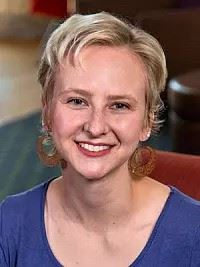Research Will Develop New Biochemical Tools to Combat Widespread Potato Virus Y (PVY) Infections
Professor Erin Weber, from the Carthage College Chemistry Department, has been awarded a $498,000 grant from the National Science Foundation (NSF) to conduct pioneering research on Potato Virus Y (PVY), one of the most pervasive plant viruses affecting up to 80% of potato crops globally. The grant was awarded through NSF’s Building Research Capacity of New Faculty in Biology program and will fund her project titled “Development of Two Biochemical Tools to Study Potato Virus Y Infection in Plants.”
Potato Virus Y poses a significant threat to potato production, leading to reduced yields and substantial economic losses worldwide. Prof. Weber’s research focuses on developing two novel biochemical tools aimed at gaining deeper insights into the virus’s infection mechanisms. The first tool is an enzymatic-based reporter, which will allow real-time tracking of PVY as it spreads through the plant. This tool will aid in understanding how the virus moves within the host and may reveal potential resistance mechanisms that could be used to protect crops.
The second tool is a synthetic PVY genome that can be altered to study the effects of specific viral mutations. This tool will not only further understanding of PVY but can also be adapted to study other plant-virus interactions, providing a broader impact on agricultural virus research.
The NSF grant, totaling $489,983 over three years, will enable Prof. Weber to establish her research program at Carthage College. The funding will support undergraduate students in summer research projects, giving them valuable hands-on experience. It will also allow for the purchase of state-of-the-art equipment, enhancing the educational opportunities for students and preparing them for future careers in research and industry. Students will also have the opportunity to present their findings at national scientific conferences.
Prof. Weber’s work is expected to advance the field of plant pathology and contribute to the development of new strategies to combat PVY and other crop-threatening viruses. For more information, interested parties can reach Prof. Weber at eweber1@carthage.edu.







